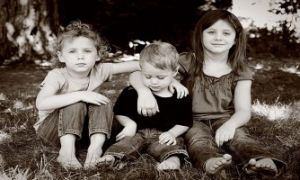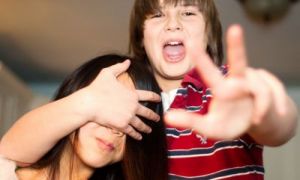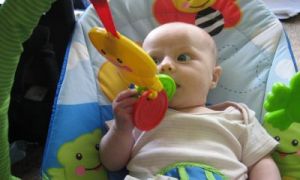

Toddlers have a greater understanding of the world around them by this stage. Their cognitive development (also known as intellectual development and thinking skills) continues to increase during this period. The ability to learn new skills, understanding of concepts, begins to make sense of current events, solve problems and use of memory steadily improves. Toddlers will begin to interpret the meanings of their experiences and they also have a vivid imagination.
As a parent, your behavioural expectations of your child can be higher than what is actually developmentally appropriate for your child's age.
Luckily not all toddlers have "temper tantrums" but if you are reading this article, well I guess you are part of the unlucky ones. Don't worry tantrums are part of your child's development. It can be horrible to be confronted by your sweet little child being so stubborn and determined to get their own way and they won't back down until they get what they want.
As part of your child's development it is normal for your child to have anxiety and fears. A baby commonly shows a fearful sign to loud noise or loss of physical support. Your child's reluctant to separate from you is a normal and healthy response and indicates healthy attachment. To some degree, separation anxiety is a sign that your child has developed healthy attachments to love ones. In most cases, it stops within 3-4 minutes after you leave.
You just picked up your toddler from child care or from a play date and you have just been informed that your child has bitten another child. Sometimes the bites are not even visible and yet other times the bites are blue and black, depending on how long your child latched on before someone intervened. For you it can be distressing and upset knowing that your child has hurt another child or an adult but please don't take your frustrations and anger out on your toddler. Even though your child may be a biter they are definitely not “naughty” or “bad”.
Is your toddler too big for their crib? Are they constantly trying to climb in and out of their cots? Is your toddler ready for toilet training? Then it’s time to say goodbye to that baby crib and transition your toddler into a big kid bed! This is a big moment for you as you watch your little baby begin to grow into an independent, active toddler. This article will provide you with practical information and strategies you can use to ease the transition from a crib to a bed.
Congratulations...your toddler is growing up! This is such a big milestone for your child to achieve. The toilet training phase is such an exciting part of you and your toddlers life. Tt can get messy at times during the beginning stages and there will be a fair share of “accidents”. Once you have trained your toddler to use the toilet, it's a great relief! No more nappies to change and best of all you don't have to spend money buying them!
 Toddlers have a greater understanding of the world around them by this stage. Their cognitive development (also known as intellectual development and thinking skills) continues… Read More
Toddlers have a greater understanding of the world around them by this stage. Their cognitive development (also known as intellectual development and thinking skills) continues… Read More
 Infants begin to develop trust when parents begin to fulfil their needs. Such as changing an infant's nappy when needed, feeding on request and holding… Read More
Infants begin to develop trust when parents begin to fulfil their needs. Such as changing an infant's nappy when needed, feeding on request and holding… Read More
 Beginning at birth the construction of thought processes, such as memory, problem solving, exploration of objects etc, is an important part of an infant’s cognitive… Read More
Beginning at birth the construction of thought processes, such as memory, problem solving, exploration of objects etc, is an important part of an infant’s cognitive… Read More
 Toddlers want to do more on their own and do not like it when you begin to establish limits on their behaviour. Tantrums can become… Read More
Toddlers want to do more on their own and do not like it when you begin to establish limits on their behaviour. Tantrums can become… Read More
 Your preschooler is now able to focus their attention more accurately and is less influenced by distractions. The intensity of questions increase as your child… Read More
Your preschooler is now able to focus their attention more accurately and is less influenced by distractions. The intensity of questions increase as your child… Read More
 John Dewey is often seen as the proponent of learning by doing – rather than learning by passively receiving. He believed that each child was active,… Read More
John Dewey is often seen as the proponent of learning by doing – rather than learning by passively receiving. He believed that each child was active,… Read More
 Toddler advance and gains new skills in Gross Motor Development milestones achieved throughout earlier years. Co-ordination and challenges that could not be performed before such… Read More
Toddler advance and gains new skills in Gross Motor Development milestones achieved throughout earlier years. Co-ordination and challenges that could not be performed before such… Read More
 Erik Erikson developed a psychosocial theory to understand how we each develop our identities through eight stages of psychosocial development from infancy to adulthood. The… Read More
Erik Erikson developed a psychosocial theory to understand how we each develop our identities through eight stages of psychosocial development from infancy to adulthood. The… Read More
 At this point preschoolers begin to interact effectively with others. Play becomes more innovative and organized and “boyfriend” or “girlfriend” begins to emerge. Preschoolers have… Read More
At this point preschoolers begin to interact effectively with others. Play becomes more innovative and organized and “boyfriend” or “girlfriend” begins to emerge. Preschoolers have… Read More
 From now, babies begin to identify and respond to their own feelings, understanding other's feelings & needs and interact positively with others. A baby's social and… Read More
From now, babies begin to identify and respond to their own feelings, understanding other's feelings & needs and interact positively with others. A baby's social and… Read More

Developmental milestones are a set of functional skills or age-specific tasks that most children can...
See more...
Sibling Rivalry is a fairly common part of childhood which usually takes place in the...
See more...
Fine Motor involves the development of the small muscles of the body. The development of...
See more...© 2009-2025 Aussie Childcare Network Pty Ltd. All Rights Reserved.

